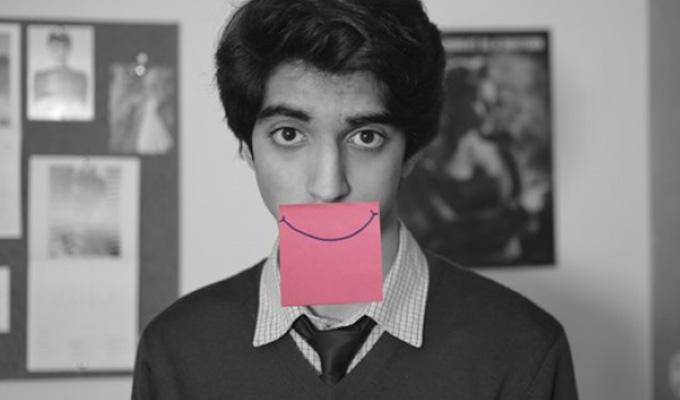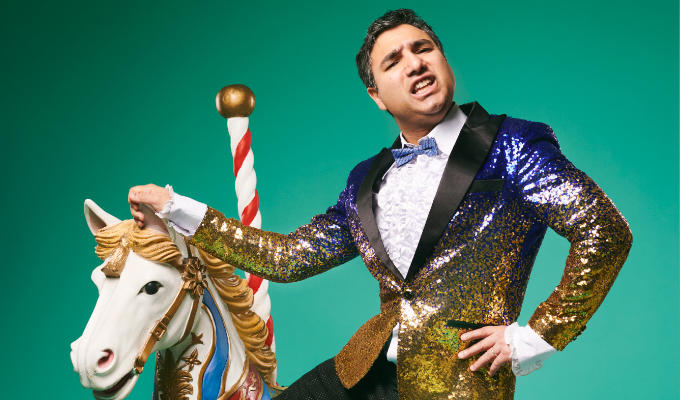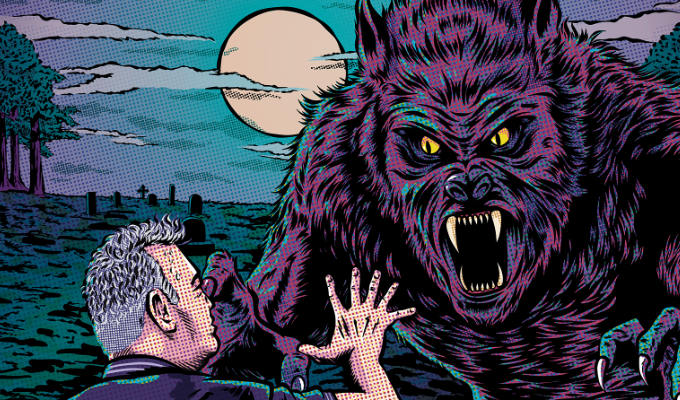
Comedy, depression and distance
Yaseen Kader on turning his low into a show
In one week, I’ll be taking my debut solo stand-up show Smile to the Edinburgh Fringe. It will represent many milestones for me: this will be my fourth time performing at the Fringe, my first time doing a full run, and, by the end of August, I will have performed the 45-minute set 25 times, more than any other show I’ve ever done.
But more than any of these, one number has stood out to me during the show’s preparation. When my producer excitedly sent me a picture of my entry in the Fringe guide, I read the words: ‘In 2013, Yaseen Kader was diagnosed with depression and left university’.
Next to the blurb is a photo, above, the first ever photo of me in any festival publication. It’s also from 2013. I remember the day I took it. Like Doc Brown recalling the day he first conceptualised the flux capacitor, I gazed into the distance, whispering only to myself: ‘My God, has it been that long?’.
This exact scenario was something my brother had suggested when I told him I was taking the show, which I’d first performed in Cambridge in October 2014, to Edinburgh. ‘Won’t it be weird,’ he asked, ‘to put yourself back in that place?’
In December 2013, one term into my second year at Cambridge University, I signed a declaration of medical leave due to ‘borderline moderate to severe depressive disorder’, which had caused me to fail my first year exams, and, despite some greatly misplaced optimism on my part, led me to spend the majority of my attempt at second year in bed with the curtains drawn. A week later, I loaded my suitcase, a backpack full of unread set texts, and a mini fridge into my parents’ car and went home, with nine months of no plans except weekly therapy facing me.
But fairly soon, I had set my focus on something else. A project. A way to turn this unexpected and initially terrifying setback into something productive. I would, on my return to university, perform an hour of stand-up about depression, therapy, and my time out.
In retrospect, this was irrationally ambitious. Though I’d been doing comedy since shortly after arriving at Cambridge, the sum total of my experience was 11 gigs, none of which had been longer than ten minutes. And yet, in early May of 2014, I found myself before the committee of a student drama society at a university I technically didn’t attend, pitching a show I had not yet written about a period of my life I was still living through.
A few weeks later, I found out I’d been given a single night performance of the show for the coming university term. Three days after that confirmation, I was on a plane to New York City to take a writing course, the other project I had given myself for my time out. I landed in Newark with the twin goals of accumulating some stories to tell, and to improving my ability to tell them.
I kept a diary every single day of the following six weeks in America, except for the last four days when, ironically, all the most exciting things were happening to me. (Tallulah Bankhead’s old adage that ‘it’s the good girls who keep diaries, the bad girls never have the time’ comes to my mind whenever I think about this).
Diary aside, even as I spoke to roommates and classmates about my time in the city, I could feel those experiences metamorphosing into narrative in real time, the fat of every anecdote being trimmed with each retelling and certain turns of phrase being codified as gospel. Throughout my entire writing process, I never transcribed the 20-minute segment about New York; by October, it was in my muscle memory from having told it so many times.
Thinking back on all of this, the way the show was conceived and written, I’ve concluded that the concerns my brother had shouldn’t trouble me too much. I return to the photo of myself in the brochure.

It was the photo I’d hurriedly sent the drama society to promote the show in 2014, past the deadline. It’s a selfie from my Cambridge room in late 2013, onto which I crudely edited a post-it note. I specifically remember the day it was taken: I felt terrible, I had done no work, but I liked my hair and wanted to document that. Every time I look at it, I’m drawn to the eyes. They’re exhausted, anxious, and frightened. As Earl Sweatshirt put it, ‘Right here. You can never mask anything. People are freaking the fuck out, and you can see it in their eyes’. And in that photo, taken at the nadir of my depression, I can see it.
I’m not entirely the same person I was in that photo, in 2013. But neither was the me who pitched the show, or the me who went to New York, or the me who performed it in Cambridge.
To be preoccupied with my change in perspective would be foolish. The show has always been about different perspectives. It was an unwritten, forward-looking aspiration when I pitched it, and a comforting reminiscence when I first performed it.
But as long as I can still convey what it was like to be me in 2013, to see through those eyes that aren’t quite mine anymore, I feel like I will have achieved my goal. And if you’re at the Fringe this year, I hope you’ll come see me try to do that.
• Yaseen Kader: Smile will at Gilded Balloon at the Counting House, 13:00.
Published: 27 Jul 2016






